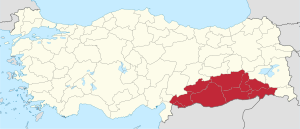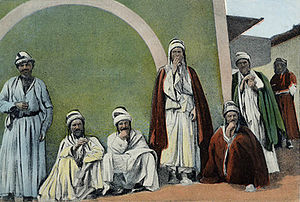Yazidis in Turkey
The Yazidis in Turkey are a part of the Yazidis who remained in modern-day Turkey after the division of the Ottoman Empire. The Yazidis in Turkey live mainly in the south-east of the country.[1]


Demography[edit]
In the 1980s, the number of Yazidis in Turkey was around 60,000.[2][3] According to the Society for Threatened Peoples, 300,000 Yazidis originally lived in Turkey.[4]
In 2003, the United States Department of State's Bureau for Democracy, Human Rights, and Labor stated that 5,000 Yazidis live in Turkey.[5]
In 2004, the Federal Office for Migration and Refugees reported that more than 2,000 Yazidis (mainly in south-eastern Anatolia) live in Turkey.[6]
In 2019, the number of Yazidis in Turkey was less than 1,000 according to the United States federal government estimate.[7]
Settlement areas[edit]
Historically, the Yazidis lived in Turkey in the east, south, and south-east of Turkey.[3] The current settlement area of Yazidis in Turkey includes Midyat and Nusaybin counties in Mardin province, Batman and Beşiri counties in Batman province and parts of İdil counties in Şırnak province. Other Yazidi settlement areas are in Sur, Bismil and Çınar counties in Diyarbakır province and in Viranşehir district in Şanlıurfa province.



History[edit]
Yazidis are native to an area of the Middle East historically known as Mesopotamia (more specifically, they are indigenous to the northern part of Mesopotamia) which also includes southeastern Turkey.[8]
The modern state of Turkey was founded in 1923. Yazidis lived on the territory of present-day Turkey before the establishment of the modern state of Turkey. Yazidi tribes lived in the Ottoman provinces of Mosul, Diyarbekir, Van, Bitlis and Aleppo after Sultan Selim conquered eastern Anatolia, Mosul and Syria between 1514 and 1516.[9]
In 1844, the Yazidis in Turkey, who were in the Tur Abdin region, were massacred by the Kurdish prince Bedirkhan Beg and his troops.[10]
In 1895, the anthropologist Ernest Chantre visited the Yazidis in Turkey and reported that the Yazidis call their language "zyman e ezda" (The language of the Yazidis).[11]
Recently, some Yazidis who are from Turkey and have lived in Germany have returned to their villages in Turkey.[12]


Flight and migration[edit]
Escape to the Caucasus[edit]
In the 18th and 19th centuries and in the early 20th century, the Yazidis in Turkey began to leave eastern Turkey and fled to Armenia and some of them later to Georgia as they were being persecuted by the Turks and the Kurds.[13]
- 19th century:
In the early 1800s, the Yazidis in Turkey began fleeing to Armenia as they were being persecuted by the Ottoman and Kurdish tribes who were trying to convert them to Islam.[14] Yazidis from the former Ottoman provinces of Van, Kars, Bayazid, and Surmali began migrating to the Caucasus in the 1830s. Most of them settled in Armenia. Others of them settled in Georgia.[15]
- Early 20th Century:
Yazidis were massacred alongside Armenians, Assyrians and Pontic Greeks during the Armenian genocide in 1915 and 1916, which then led to many Yazidis fleeing.[14][16][17][18] Turkey denies the genocide.[19] During the genocide there was the slogan "Those who kill 7 Armenians will go to Heaven" and also the version "Those who kill 7 Yazidis will go to Heaven" were used.[16] According to Aziz Tamoyan, over 300,000 Yazidis were killed with the Armenians, while others fled to Transcaucasia.[20]
Escape to Germany[edit]
Due to persecution, oppression and discrimination as an ethno-religious group, Yazidis fled Turkey in a large wave from the 1980s and sought refuge in Germany.[21] After fleeing, the Federal Constitutional Court declared the Yazidis to be a persecuted group.[22]
According to the German Bundestag, the majority of Yazidis have left Turkey in the last 30 years.[23]
In 1989, Gernot Wießner and Herbert Schnoor traveled to Turkey with a delegation to see for themselves the persecution of the Yazidis. They campaigned in North Rhine-Westphalia for the right to stay for the Yazidis, whereupon the Yazidis were recognized as a persecuted group in Germany.[24]
See also[edit]
Literature[edit]
- Çakır Ceyhan Suvari: Yezidis: An Ethno-Religious Group in Turkey (2016)
- Rohat Cebe, Ersoy Soydan: Batman Yezidis and Yezidis Oral Tradition (2012)
External links[edit]
| Wikimedia Commons has media related to Yezidis in Turkey. |
References[edit]
- ↑ Saccone, Richard (2008). The Unseen War in Iraq: Insurgents in the Shadows. Broadmind Press. p. 235. ISBN 978-1-56591-134-5. Search this book on

- ↑ Açikyildiz, Birgül (2014-12-23). The Yezidis: The History of a Community, Culture and Religion. I.B.Tauris. p. 63. ISBN 978-0-85772-061-0. Search this book on

- ↑ 3.0 3.1 "Yezidis (Ezidis)". Minority Rights Group. 2015-06-19. Retrieved 2022-02-04.
- ↑ "Yeziden". Gesellschaft für bedrohte Völker e.V. (GfbV). Retrieved 2022-02-04.
- ↑ Jödicke, Ansgar (2017-08-04). Religion and Soft Power in the South Caucasus. Routledge. p. 171. ISBN 978-1-351-79789-4. Search this book on

- ↑ "Rückkehr von Yeziden in die Türkei" (PDF). Bundesamt für Anerkennung ausländischer Flüchtlinge. 2004. Archived from the original (PDF) on 2019-01-03. Retrieved 2022-02-04.
- ↑ "DFAT Country Information Report Turkey" (PDF). Australian Government - Department of Foreign Affairs and Trade. 2020. p. 22. Retrieved 2022-02-04.
- ↑ Williams, Victoria R. (2020-02-24). Indigenous Peoples: An Encyclopedia of Culture, History, and Threats to Survival [4 volumes]. ABC-CLIO. pp. 1173–1174. ISBN 978-1-4408-6118-5. Search this book on

- ↑ Gölbaşı, Edip (2008). "The Yezidis and the Ottoman State: Modern Power, Military Conscription, and Conversion Policies, 1830-1909" (PDF). p. 5. Retrieved 2022-02-04.
- ↑ Tagay, Sefik; Ortac, Serhat (2016). "Die Eziden und das Ezidentum – Geschichte und Gegenwart einer vom Untergang bedrohten Religion" (PDF) (in Deutsch). Landeszentrale für politische Bildung, Hamburg. p. 50. Retrieved 2022-02-04.
- ↑ Chantre, Ernest (1895). "Notes ethnologiques sur les Yésidi". Publications de la Société Linnéenne de Lyon (in français). 14 (1): 74. doi:10.3406/linly.1895.12079.
- ↑ "Jesiden in der Türkei: Alte Heimat, neue Heimat - Qantara.de". Qantara.de - Dialog mit der islamischen Welt (in Deutsch). Retrieved 2022-02-04.
- ↑ Stansfield, Gareth; Shareef, Mohammed (2017-08-15). The Kurdish Question Revisited. Oxford University Press. p. 168. ISBN 978-0-19-086972-4. Search this book on

- ↑ 14.0 14.1 "A Conditional Coexistence:Yezidi in Armenia". www.culturalsurvival.org. Retrieved 2022-02-04.
- ↑ Savucu, Halil (2016-10-10). Yeziden in Deutschland: Eine Religionsgemeinschaft zwischen Tradition, Integration und Assimilation (in Deutsch). Tectum Wissenschaftsverlag. p. 94. ISBN 978-3-8288-6546-4. Search this book on

- ↑ 16.0 16.1 "How did Yezidis become Muslim?". www.rudaw.net. Retrieved 2022-02-04.
- ↑ "Armenia is the only country in the world where Yazidis are taught at school in their own language: The National News". www.1lurer.am. Retrieved 2022-02-04.
- ↑ Bozarslan, Hamit; Gunes, Cengiz; Yadirgi, Veli (2021-04-22). The Cambridge History of the Kurds. Cambridge University Press. p. 509. ISBN 978-1-108-58301-5. Search this book on

- ↑ Huch, Tobias; Shalicar, Arye Sharuz (2018-12-03). Kurdistan: Wie ein unterdrücktes Volk den Mittleren Osten stabilisiert (in Deutsch). Riva Verlag. p. 198. ISBN 978-3-95971-947-6. Search this book on

- ↑ Rezvani, Babak (2014-03-15). Ethno-territorial conflict and coexistence in the caucasus, Central Asia and Fereydan: academisch proefschrift. Amsterdam University Press. p. 145. ISBN 978-90-485-1928-6. Search this book on

- ↑ Baeck, Jean-Philipp (2014-08-16). "Jesiden in Norddeutschland: Die zweite Heimat". Die Tageszeitung: taz (in Deutsch). ISSN 0931-9085. Retrieved 2022-02-04.
- ↑ Szatkowski, Tim (2016-05-24). Die Bundesrepublik Deutschland und die Türkei 1978 bis 1983 (in Deutsch). Walter de Gruyter GmbH & Co KG. p. 146. ISBN 978-3-11-044656-2. Search this book on

- ↑ "Antwort der Bundesregierung" (PDF). German Bundestag. 2014. p. 1. Retrieved 2022-02-04.
- ↑ Schnoor, Herbert (2001). Unvergessen in: Der Herr schafft Gerechtigkeit und Recht (in Deutsch). Wuppertal. pp. 59–67. Search this book on

This article "Yazidis in Turkey" is from Wikipedia. The list of its authors can be seen in its historical and/or the page Edithistory:Yazidis in Turkey. Articles copied from Draft Namespace on Wikipedia could be seen on the Draft Namespace of Wikipedia and not main one.
